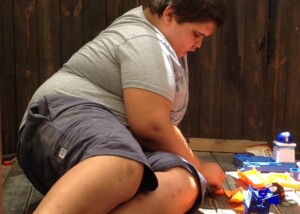
If your child is obese, it’s SO SAFE to get him/her into weightlifting for fantastic benefits!
Obese children in particular will greatly benefit from lifting weights, and this article explains the details.
Obese children as young as seven years can begin a supervised weightlifting program.
As a former personal trainer I strongly endorse strength training for overweight children.
So does Mayoclinic.com; the site says that kids can begin strength training “as early as age 7 or 8,” and that “strength training can become a valuable part of an overall fitness plan.”
Before I explain the tremendous benefits of weightlifting for obese children, I first want to briefly dispel a few myths.
“Lifting weights will stunt growth.”
Wrong. Smoking and poor nutrition may stunt growth. Strength training will not disrupt growth plate development.
This myth probably arose from the fact that often, a gym’s most muscled guys are on the short side.
This is better explained by short stature inspiring a man to build muscle since he can’t grow taller.
“Lifting weights is dangerous for children.”
With proper instruction and supervision, kids are far less likely to suffer injuries from strength training than from supposedly “safer” sports.
A report from the Centers for Disease Control and Prevention states that playground injuries are the No. 1 reason children under 10 visited the ER between 2001 and 2009.
Think lifting weights is more dangerous than riding a bike?
For boys 10-19, bike riding was a leading cause of head injuries.
For girls 10-19 it was bike riding, soccer and basketball.
Head injuries are extremely rare in weightlifting.
But what about musculoskeletal injuries?
The Consumer Products Safety Commission reports that basketball, cycling, football and soccer — in that order, head the list (e.g., 500,000 injuries a year in soccer).
Of course, millions of young kids play these sports, while millions of young kids do NOT lift weights.
Absolute numbers aside, strength training is slow, involves no wheels or possible collisions with other athletes, does not involve airborne objects, has very little slip-and-fall risk, and does not involve running.
This structure alone makes it obvious that lifting weights is not a dangerous undertaking for young children, including the obese.
Lifting weights for overweight children can be very basic. Here are the benefits of weightlifting for heavy children:
Lowers risk of muscle and joint injury from “safer” sports!
Improves performance in other sports
Strengthens bones
Inspires healthier eating habits
Promotes better cholesterol profile
Burns fat, improves strength
Dramatically improves self-esteem
If you’re still reluctant to get your young overweight child started on a weightlifting program, remind yourself that your child probably already IS lifting weights — every time they take out the garbage, carry luggage, carry a younger sibling or give piggy back rides to playmates, shovel snow, help you carry some heavy boxes around, pick up the dog, etc.
Strength training for obese kids need not be complicated nor consist of the giant moves you’ve seen in the Olympics.
Check your local recreation center to see if it offers beginner’s classes, or speak to a personal trainer.
Also, weightlifting implements designed just for children are on the market.





































